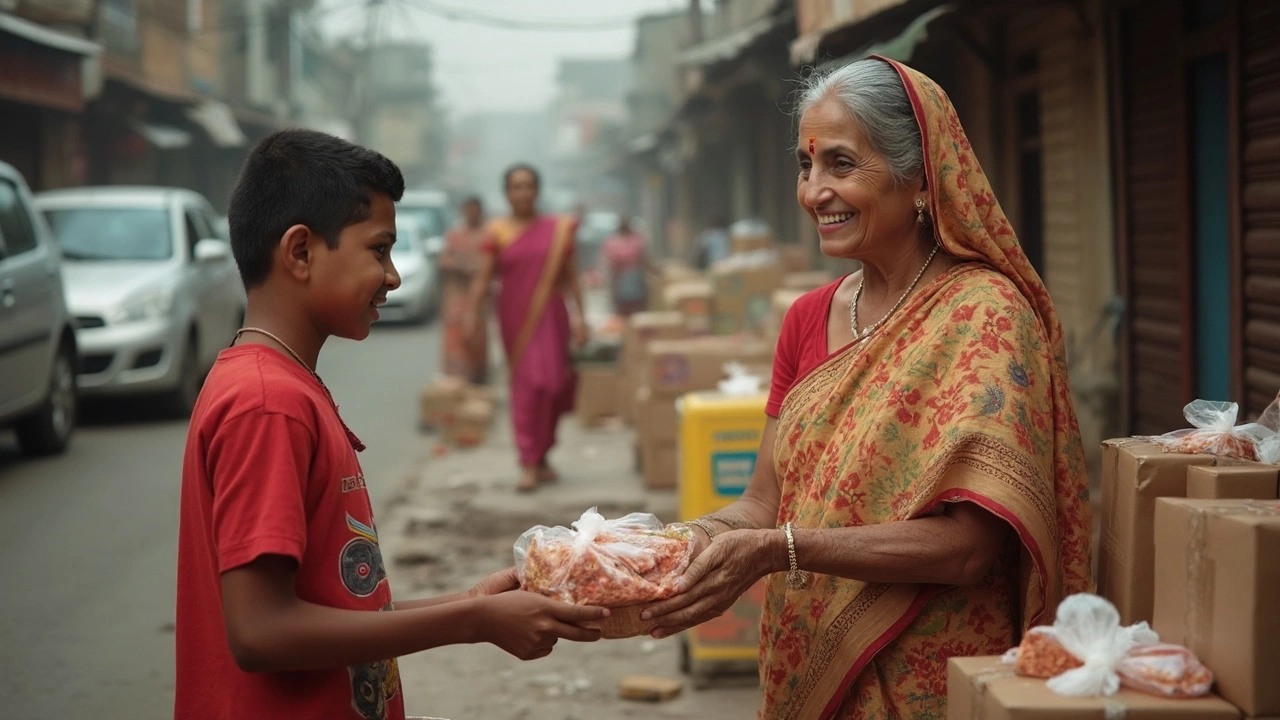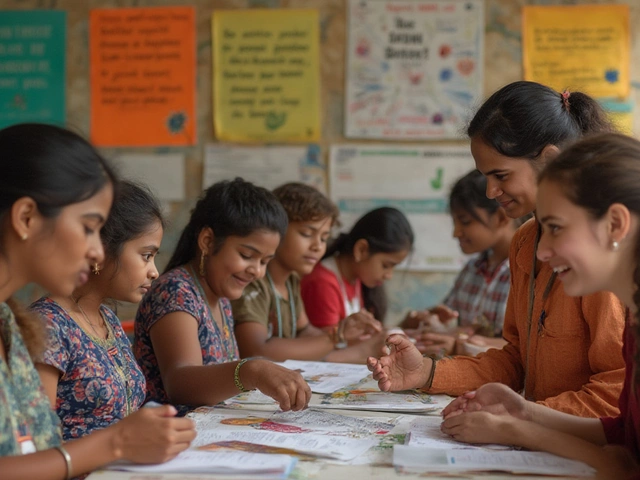If you've ever wondered how to get the most out of volunteering, you need to know about the four C's. These are easy to remember, and they really are the backbone of being an awesome volunteer. Whether you’re thinking about mentoring at a local school, sorting food at the food bank, or helping out at big fundraising events, the same four words come up again and again: communication, commitment, community, and compassion.
It’s not about being perfect, it’s about understanding what makes you valuable to the team and the people you’re helping. Once you know what these four points look like in real life, you can spot any strengths or gaps and start growing right away. Plus, you’ll know how to show organizations you’re serious when you apply. The best part? Each 'C' comes with easy ways to practice—right from day one.
Let’s break them down, one by one, with clear steps on how to build these skills and spot opportunities that fit your interests. Ready to see what makes a standout volunteer? Let’s jump in.
Clear Communication
Being able to talk and listen well is the foundation for every successful volunteer gig. If you’re not sure where to start, remember: good communication isn’t about fancy speeches, it’s about making things clear and simple for everyone involved. This is true whether you’re reporting back after an event or checking in with your team at the start of a shift.
One recent survey by VolunteerMatch found that 76% of organizations say clear instructions make their volunteers more confident and productive. No one likes feeling lost, right? That’s why asking questions when you don’t understand something is actually a smart move—not a sign you’re not paying attention. It helps avoid mistakes, saves time, and builds trust with your team organizers.
- Use everyday language—skip the jargon. If you don’t know a word or acronym, just ask.
- Give regular check-ins, whether by text, app, or in person. Updates keep everyone on the same page.
- If you see a problem, speak up early. Solutions work best before things get big.
- Listen just as much as you talk. It’s the fastest way to pick up new info and not miss changes that pop up last minute.
Here’s a trick: Think of yourself as a bridge connecting people. If the people you’re helping are from different backgrounds or ages, adapt how you say things. Maybe grandma volunteers don’t use TikTok chat, but your teen helpers do. Meeting folks where they are always pays off.
Clear communication makes volunteering feel easier, avoids mix-ups, and helps everyone feel included, even brand new people. Once you get into the habit, it spreads to all areas of your life—not just volunteering.
Commitment that Counts
Nothing earns trust faster in the volunteer world than showing up when you say you will. Commitment is more than writing your name on a signup sheet—it's about sticking to your word, even if your schedule gets a bit wild. Most volunteer coordinators agree: reliable help is what keeps projects moving forward. A 2023 survey by VolunteerMatch revealed that nearly 60% of organizations said their biggest challenge was managing people who dropped out at the last minute.
That’s why being realistic about your time is huge. Are you free every Saturday morning, or do you just have a few hours every other month? Either way, clear communication about what you can commit to makes life easier for everyone. Here’s what helps you stand out as someone with real commitment:
- Sign up for roles you can stick with, not just the ones that sound exciting.
- If something comes up, let your volunteer coordinator know right away.
- Keep a calendar and set reminders for shifts or events.
- Finish what you start, even if it’s not always the flashy part of the job.
People sometimes overpromise because they're excited, but being honest about your limits means the team can count on you. Some places even offer short-term volunteer opportunities—like single-day cleanups or packing drives—if you aren’t ready to commit long-term.
Check this quick table to see why groups value steady volunteers so much:
| Volunteer Retention Rate | Impact on Projects |
|---|---|
| Above 60% | Projects finished faster, higher morale |
| Below 40% | Delays, burnout for other volunteers |
Bottom line: genuine commitment lets organizations serve more people and wastes less time. It also helps you build solid relationships and get more out of the experience.

Building Community
When you think about volunteer opportunities, building community is the piece that brings everyone together. It's about creating real connections, not just finishing a task and heading home. Whether you're volunteering solo or as part of a group, what you do can ripple out and make your neighborhood, school, or organization stronger.
Here’s the thing: Building community isn’t just about meeting new people—it’s about learning to work with folks who might have a totally different background from yours. It’s great for growing your network, developing empathy, and building skills you might not expect, like problem-solving on the fly or learning new tech tools for group chats and project planning.
- Join group projects — things like neighborhood clean-ups or fundraisers get everyone talking and working as a team.
- Show up regularly — people start to recognize you, leading to real friendships and trust, which help projects succeed.
- Share your personal skills — maybe you know graphic design, run social media, or speak another language. Bring it to the table!
- Ask others for their ideas — community-building is about listening, not just leading.
According to a 2023 report by the Corporation for National and Community Service, people who volunteered at least once a month were 50% more likely to have a strong support network compared to those who didn’t volunteer at all. That’s not just about getting help if you’re in a jam—stronger community ties mean more chances to get involved, discover new passions, and find jobs or mentors down the line.
Here’s a quick glance at some community-building wins from real-life volunteering:
| Type of Volunteering | Community Impact |
|---|---|
| Food Drives | Connects neighbors, reduces local hunger |
| Mentoring Youth | Builds intergenerational trust and support |
| Environmental Cleanup | Brings together people who care about local parks or rivers |
So if you're picking your next volunteer spot, think about where you can really plug in and get to know people. A stronger community isn’t just good for others—it’s better for you, too. And the change you help create? It sticks around long after your volunteer shift is over.
Compassion in Action
When people talk about the 4 C's of volunteering, compassion is the one that keeps everything honest. You can’t fake it. Compassion means noticing when others need help, listening without judging, and acting in ways that make things better for someone else. It’s what turns a job into real volunteer opportunities that matter.
Science actually backs this up. A study from Harvard showed that people who volunteer regularly report higher levels of empathy and happiness. They’re not just helping others; they’re finding more meaning in their own lives. That’s compassion, doing its thing both ways.
You’ll spot compassion in the little stuff. Maybe you’re handing out meals, but you also take the time to smile and ask someone how their day’s going. Or you’re helping at a youth center and remember the names of the kids. That’s what people remember more than any checklist you finish.
Want to put compassion into action? Start with small habits that you can keep up every time you volunteer. Here’s what works:
- Listen more than you speak—let people tell their story before jumping in to fix things.
- Offer specific help, not just a vague “let me know if you need something.”
- Keep an open mind. You never really know what someone is dealing with until they tell you.
- Give your full attention when you’re helping, even if it’s just for a few minutes.
Some groups even provide training on how to handle tough conversations or emotional situations, so don’t feel like you have to wing it. If you’re unsure, ask for tips from more experienced volunteers or supervisors—there’s no shame in wanting to do your best.
And here’s something practical: in food banks across the U.S., volunteers who take time to engage with clients (just a friendly chat’s enough) are linked to higher client satisfaction, according to Feeding America. It’s proof that compassion in action makes a noticeable difference.





